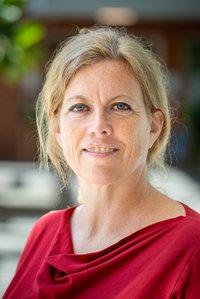Newsletter from the Dean - November 2023
Dear all. Now, almost all leaves have left the branches of the trees, and we find ourselves in the midst of the months that are perhaps coziest when the rain is not pouring outside. During this time of darkness, I am pleased that the faculty management, the management of the three schools, and division managers gathered last week for the management forum meeting in Horsens.

This community prepares us to make the most of the next six months, which is a kind of limbo before we truly get a sense of what the reform of the master’s degree programmes will mean for the faculty. At the same time, the extended management forum is a solid foundation for creating the inclusive culture that, in my view, is essential for a well-functioning faculty.
But let me, as was also the case at the management forum, start with the financial situation. Money has been tight in 2023, and the coming years will also be characterized by tight budgets. This is due, among other things, to a general decline in student intake and the 10 % enrolment reduction caused by the geographical relocation plan. Although, we still do not know the outcome of the reform of the master’s degree programmes, we need to work on adapting educational activities due to the relocation reform, and we must prepare ourselves for the faculty to become smaller over the next ten years. The changes are happening at different speeds at the three schools. DPU is already well underway, while the other two schools are not quite as far. However, we must all do our best to prioritize the possibility of refilling positions so that we continue to be a vibrant faculty.
Regarding the master’s degrees reform, all negotiations are currently taking place behind closed doors, with only rectors and pro-rectors participating – with confidentiality obligations. Since we still do not know exactly how the reform will affect Arts' programmes, we spent the time at the management forum discussing various scenarios and principles for how we can sensibly deal with the upcoming cap on enrolment, new business master's degree programmes, and the transition to one-year master's programmes. For me, it is important that all heads of departments and division managers are as well-informed as possible so that this knowledge can reach all employees at Arts. At the same time, we are still very interested in hearing your ideas and suggestions for solutions to issues relating to the reform of the master’s degree programme, and you should know that at AU and faculty level, we are doing what we can to ensure the best solutions for the faculty.
Besides focusing on the reform, we also had good discussions at the management forum about the number of short-term contracts and the reduction of AU's carbon footprint. Regarding AU's carbon footprint, in addition to looking at our buildings, we have been tasked with, among other things, reducing the number of flights. This is a topic that you will get to discuss in your respective departments, as we need all good ideas and inputs to succeed.
Before I conclude, I would like to take this opportunity to congratulate us all on the fact that the Faculty of Arts has once again climbed a few places to no. 41 at the Times Higher Education World University Ranking. So, we are among the best Arts and Humanities faculties in the world, the highest-ranked in the Nordic region – and the faculty at AU with the highest ranking.
Well done – or in JYSK, not too bad at all.
Best regards,
Maja Horst
Dean
P.S. Remember the Academic Council's event - Arts Roundtable - Collaborative Arts on November 24, 2023, where challenges and opportunities for the faculty's disciplines in the coming years will be discussed.